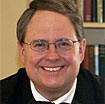Commentary on Acts 17:22-31
Preacher and congregation should consider this text within the framework from which the lectionary has extracted it.
A resolutely monotheistic Jew, Paul is incensed (paroxyneto) by the idols proliferating in Athens (Acts 17:16). In synagogue and marketplace he has been making his case for the gospel, in discussion with Epicureans and Stoics (v. 17). Judging Paul a philosophical dilettante, some have misunderstood his preaching as promotion of two foreign deities, Jesus and Resurrection (v. 18; anastesas is a feminine participle.) That is not only ironic but dangerous: Socrates was executed for corrupting Athens with strange new gods (Plato Apology 24B-C). In spite of the NRSV’s translation of v. 19 as a gentle inquiry (“May we know what this new teaching is?”) Paul’s address before the Areopagus–both a hill and a city council on whose ridge it convened–could have been a serious arraignment with his life in the balance. Far more is here at stake than mere theological debate (cf. v. 21). As in 1 Peter (3:14-16), Paul, a Hellenistic Jew, has been required to offer a reasoned defense for his Christian hope before suspicious Gentile authorities.
Here let’s pause to take our bearings on a text that trips up both homileticians and academicians. The latter have sometimes judged Acts 17:22-31 as Luke’s excursion into natural theology: tracing God’s existence from the natural world. Measured by Paul’s own “word of the cross” (1 Cor 1:18-31), Acts 17 has been found wanting by rigorous Protestants. We shall see, however, that such an exegesis probably gets the text wrong; and, while Luke is not Paul, the former also has sharp teeth. Preachers further face the unsavory prospect of hitching their sermons onto one of Luke’s: a second-generation evangel asynchronous with our own time and place. Initial points of contact between our culture and first-century Athens are not hard to find, however. Our world, like theirs, is variously if sometimes stupidly religious. Now as then, Christianity faces attackers of all stripes: the sophisticated, the unthinking, and the powerful who are easily threatened. Anyone who considers idolatry dead in contemporary culture has not been paying attention to Wall Street and Madison Avenue, to Hollywood or Washington or Beijing.
With Acts 17 as our guide, how shall we make our defense before those who demand an accounting of the hope that is in us?
We shall honor our challengers’ shared humanity by acknowledging points of common ground with them. Even when repulsed by them, we examine closely the objects of others’ worship (v. 23). Immediately dismissing their beliefs dishonors the religious hunger we mutually share; moreover, it fast deteriorates into our arrogance and intellectual slovenliness. (“I’ve no need to explain myself to you, since your religious opinion is self-evidently inferior to mine.”) In Luke’s presentation, Paul can sympathize with the search for an unknown god (v. 23a), the all-too-human groping for the Creator nearer to us than we know (v. 27). Paul highlights those points where the gospel conceptually intersects with different worldviews: “the God who made the world and everything in it” (v. 24a, 25b), who needs no human shrines (v. 24b-25a) and transcends human imagination (v. 29). Pagan claims about the God who is human life’s source and sustenance (v. 28) can be accepted without compromising the Christian message. Allowing that God has formerly excused human ignorance (v. 30; see also 3:17; 13:27), Luke tacitly contradicts another voice that became canonical: Paul’s own (Rom 1:18-21). Against a paranoid conservatism Luke suggests that all other philosophical or religious views do not have to be dynamited as false in order to prove the gospel true.
On the coin’s other side, Acts 17 offers no comfort for a mushy liberalism. We shall hold our ground in matters that strike at the nerve of Christian faith. This takes discernment, for not everything held dear by every Christian carries the universal significance occasionally ascribed to it. In this speech, however, there’s no mistaking the core of a gospel revealed, not read off nature’s page: the need for universal repentance from sin and repudiation of every pretender to the throne on which God alone sits (vv. 29-30), supported by the promise that the world will be judged at a fixed time of divine selection by the messianic agent whom God raised from death (v. 31). The catholicity of those claims–the punch-line of the Areopagus address–is recognizable by their expression, with modifications, throughout the Christian canon (for example, Ps 9:7-8; Dan 12:1-4; Matt 28:18-20; Mark 13:24-37; John 5:25-29; 1 Thess 1:9-10; 1 Tim 6:14-16; Heb 10:19-25; Jude 17-25; Rev 22:12-17). The now of God’s command (Acts 17:30), hammered by Paul, is as decisive as today in Jesus’ sermon at Nazareth (Luke 4:21). The gospel demarcates a critical threshold from which, for the preacher, there is no turning back.
This side of paradise, in a world whose redemption is assured though not yet consummated, witnesses to Christ learn to live in unresolved tension. Everywhere is ambiguity. Athens, threatened by something strange, is the city that revels in novelty (Acts 17:21). An audience is deisidaimonesteros: more than usually religious, more than normally superstitious (v. 22). (The term is inherently equivocal: Paul’s listeners could have received as a compliment what he intended as pejorative or at least subtle.) A single Easter sermon evokes a range of response: jeers, curiosity, embrace (vv. 32-34). Paul departs one city with his life intact, soon to leave another contemplating his death (20:23-25, 36-38). For preacher and listeners alike there are no guarantees, save that God owns the future. In that there is solace, both for congregations thirsty for courage from dry pulpits and for pastors whose thoughtful tidings must penetrate ears thickened by sound-bites. “We will hear you again about this” (17:32) may be noncommittal, but at least it implies a message received and an invitation for more.

April 27, 2008